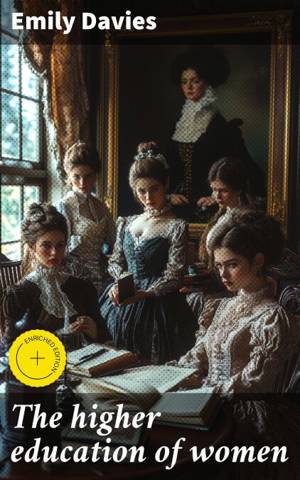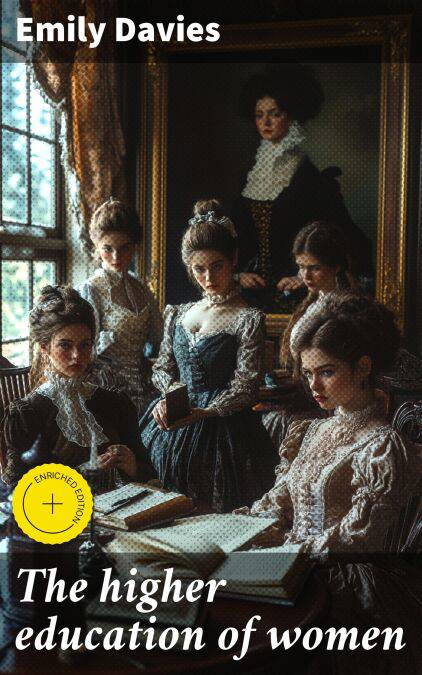
- Retrait en 2 heures
- Assortiment impressionnant
- Paiement sécurisé
- Toujours un magasin près de chez vous
- Retrait gratuit dans votre magasin Club
- 7.000.0000 titres dans notre catalogue
- Payer en toute sécurité
- Toujours un magasin près de chez vous
The higher education of women EBOOK
Enriched edition. Empowering Women Through Education: A Victorian Feminist Manifesto
Emily Davies
Ebook | Anglais
1,99 €
+ 1 points
Format
Description
In "The Higher Education of Women," Emily Davies presents a compelling argument for the necessity of women's access to higher learning in the 19th century, a time when societal norms often relegated women to the domestic sphere. Employing a persuasive literary style marked by clarity and eloquence, Davies explores the obstacles women faced in pursuing education and the transformative power of knowledge. Her work situates itself within the broader context of the women's rights movement, drawing on contemporary educational theories and the sociopolitical climate of Victorian England to advocate for equality in educational opportunities. Emily Davies, an early feminist and one of the founders of Girton College, the first residential college for women in the UK, championed women's education throughout her life. Her personal experiences as a student and educator revealed the stark inequities underlining gender and education, motivating her to write this work as both a critique of the status quo and a blueprint for reform. Her insights illuminate the historical struggle for gender equality in education and reflect her dedication to elevating the status of women in society. This book is essential reading for anyone interested in gender studies, educational reform, and the history of women's rights. Davies' insightful arguments and passionate advocacy illuminate a pivotal chapter in the ongoing discourse surrounding education and equality, making it relevant for contemporary readers seeking to understand the roots of gender inequality in academia.
In this enriched edition, we have carefully created added value for your reading experience:
- A succinct Introduction situates the work's timeless appeal and themes.
- The Synopsis outlines the central plot, highlighting key developments without spoiling critical twists.
- A detailed Historical Context immerses you in the era's events and influences that shaped the writing.
- A thorough Analysis dissects symbols, motifs, and character arcs to unearth underlying meanings.
- Reflection questions prompt you to engage personally with the work's messages, connecting them to modern life.
- Hand‐picked Memorable Quotes shine a spotlight on moments of literary brilliance.
- Interactive footnotes clarify unusual references, historical allusions, and archaic phrases for an effortless, more informed read.
In this enriched edition, we have carefully created added value for your reading experience:
- A succinct Introduction situates the work's timeless appeal and themes.
- The Synopsis outlines the central plot, highlighting key developments without spoiling critical twists.
- A detailed Historical Context immerses you in the era's events and influences that shaped the writing.
- A thorough Analysis dissects symbols, motifs, and character arcs to unearth underlying meanings.
- Reflection questions prompt you to engage personally with the work's messages, connecting them to modern life.
- Hand‐picked Memorable Quotes shine a spotlight on moments of literary brilliance.
- Interactive footnotes clarify unusual references, historical allusions, and archaic phrases for an effortless, more informed read.
Spécifications
Parties prenantes
- Auteur(s) :
- Editeur:
Contenu
- Nombre de pages :
- 63
- Langue:
- Anglais
Caractéristiques
- EAN:
- 4066339526617
- Date de parution :
- 09-07-23
- Format:
- Ebook
- Protection digitale:
- Digital watermarking
- Format numérique:
- ePub

Seulement chez Librairie Club
+ 1 points sur votre carte client de Librairie Club
Les avis
Nous publions uniquement les avis qui respectent les conditions requises. Consultez nos conditions pour les avis.





